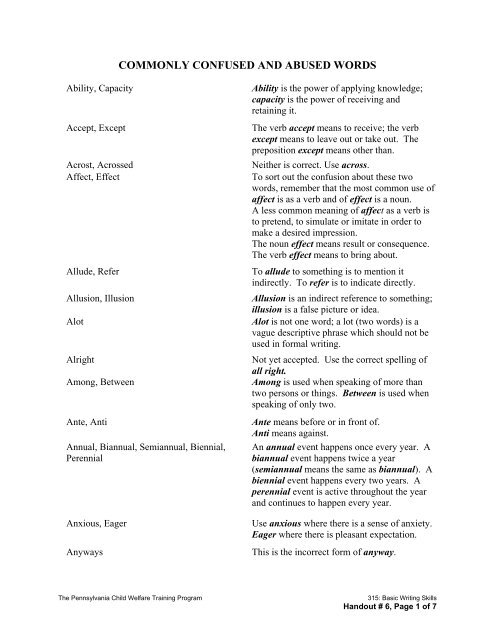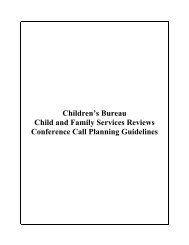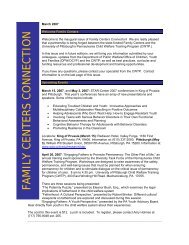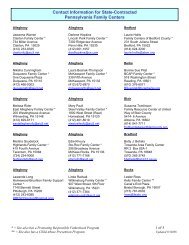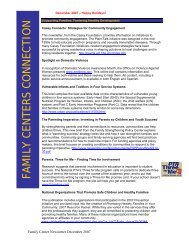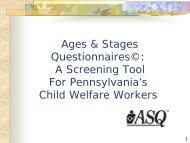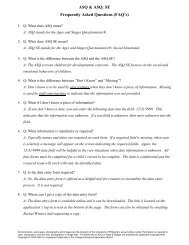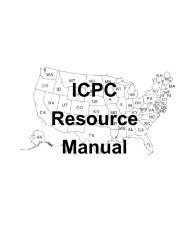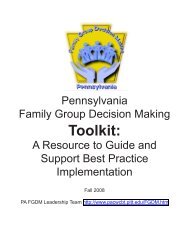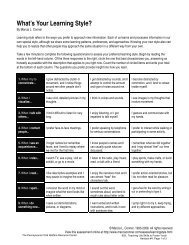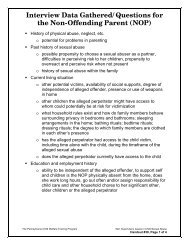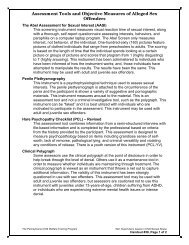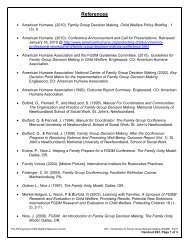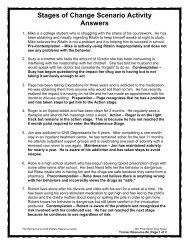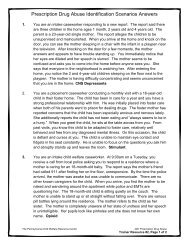commonly confused and abused words - Pennsylvania Child ...
commonly confused and abused words - Pennsylvania Child ...
commonly confused and abused words - Pennsylvania Child ...
Create successful ePaper yourself
Turn your PDF publications into a flip-book with our unique Google optimized e-Paper software.
COMMONLY CONFUSED AND ABUSED WORDS<br />
Ability, Capacity<br />
Accept, Except<br />
Acrost, Acrossed<br />
Affect, Effect<br />
Allude, Refer<br />
Allusion, Illusion<br />
Alot<br />
Alright<br />
Among, Between<br />
Ante, Anti<br />
Annual, Biannual, Semiannual, Biennial,<br />
Perennial<br />
Anxious, Eager<br />
Anyways<br />
Ability is the power of applying knowledge;<br />
capacity is the power of receiving <strong>and</strong><br />
retaining it.<br />
The verb accept means to receive; the verb<br />
except means to leave out or take out. The<br />
preposition except means other than.<br />
Neither is correct. Use across.<br />
To sort out the confusion about these two<br />
<strong>words</strong>, remember that the most common use of<br />
affect is as a verb <strong>and</strong> of effect is a noun.<br />
A less common meaning of affect as a verb is<br />
to pretend, to simulate or imitate in order to<br />
make a desired impression.<br />
The noun effect means result or consequence.<br />
The verb effect means to bring about.<br />
To allude to something is to mention it<br />
indirectly. To refer is to indicate directly.<br />
Allusion is an indirect reference to something;<br />
illusion is a false picture or idea.<br />
Alot is not one word; a lot (two <strong>words</strong>) is a<br />
vague descriptive phrase which should not be<br />
used in formal writing.<br />
Not yet accepted. Use the correct spelling of<br />
all right.<br />
Among is used when speaking of more than<br />
two persons or things. Between is used when<br />
speaking of only two.<br />
Ante means before or in front of.<br />
Anti means against.<br />
An annual event happens once every year. A<br />
biannual event happens twice a year<br />
(semiannual means the same as biannual). A<br />
biennial event happens every two years. A<br />
perennial event is active throughout the year<br />
<strong>and</strong> continues to happen every year.<br />
Use anxious where there is a sense of anxiety.<br />
Eager where there is pleasant expectation.<br />
This is the incorrect form of anyway.<br />
The <strong>Pennsylvania</strong> <strong>Child</strong> Welfare Training Program<br />
315: Basic Writing Skills<br />
H<strong>and</strong>out # 6, Page 1 of 7
Apt, Likely, Liable<br />
Ascent, Assent<br />
Bad, Badly<br />
Be sure <strong>and</strong><br />
Between, Among<br />
Bi, Semi<br />
Bring, Take<br />
Can, May<br />
Capital, Capitol<br />
Complement, Compliment<br />
Apt implies a natural tendency. Liable<br />
suggests the possibility of risk, while likely<br />
conveys simple probability.<br />
Ascent is rising; assent is agreement.<br />
To help you decide whether to use the<br />
adjective bad or the adverb badly, substitute a<br />
synonym in a sentence that calls for one or the<br />
other. Substitute unhappy <strong>and</strong> unhappily,<br />
Which fits?<br />
Use be sure to instead.<br />
Use between when individual relationships are<br />
emphasized <strong>and</strong> the number is unspecified.<br />
Use among with unspecified numbers if<br />
individual relationships are not emphasized.<br />
To minimize the confusion surrounding these<br />
two prefixes, use bi in the sense of every two<br />
weeks (biweekly) or every two months<br />
(bimonthly); use semi to mean twice each<br />
week (semiweekly), twice each month<br />
(semimonthly), <strong>and</strong> so on.<br />
Bring means the action is directed toward the<br />
speaker; take means the action is directed away<br />
from the speaker.<br />
The rule that distinguishes between can (the<br />
ability or power to do something) <strong>and</strong> may<br />
(permission to do it) is weakening. Formal<br />
usage still required the distinction, despite the<br />
prevalence of can for may in speech.<br />
Capital refers to wealth, the city that is the seat<br />
of government, or an uppercase letter. Capitol<br />
is the building in which state or federal<br />
officials congregate.<br />
Complement is both a verb <strong>and</strong> a noun,<br />
meaning to complete a whole or satisfy a need.<br />
Compliment also functions as both verb <strong>and</strong><br />
noun, meaning praise.<br />
The <strong>Pennsylvania</strong> <strong>Child</strong> Welfare Training Program<br />
315: Basic Writing Skills<br />
H<strong>and</strong>out # 6, Page 2 of 7
Comprise<br />
Contact<br />
Continual, Continuous<br />
Convince, Persuade<br />
Council, Counsel, Consul<br />
Different from, Different than<br />
Dilemma<br />
Disburse, Disperse<br />
Discreet, Discrete<br />
Disinterested, Uninterested<br />
One of our most <strong>abused</strong> <strong>words</strong>, comprise<br />
means to include or be made up of; it is<br />
frequently <strong>confused</strong> with compose or<br />
incorrectly used as a synonym for constitute.<br />
The whole comprises the parts: the parts<br />
constitute the whole.<br />
Wrong: High tech companies comprise only<br />
six percent of GNP.<br />
Right: High tech companies constitute only six<br />
percent of GNP.<br />
Not acceptable as a verb. . . use phone or visit,<br />
etc.<br />
Dictionaries now list these <strong>words</strong> as<br />
synonymous, but maintaining the distinction<br />
between them helps preserve the richness of<br />
our vocabulary. Continual means over <strong>and</strong><br />
over again; continuous means uninterrupted or<br />
unbroken.<br />
Synonyms; however use persuade to precede<br />
an infinitive.<br />
Council, always a noun, refers to an<br />
assemblage of persons or a committee.<br />
Counsel has both verb <strong>and</strong> noun forms,<br />
meaning to advise, the advice itself, or an<br />
attorney.<br />
Different from is preferred when it is followed<br />
by a single noun, pronoun, or short phrase.<br />
Different than is acceptable when it is<br />
followed by a clause or avoids wordiness.<br />
Reserve the use of dilemma for situations<br />
involving a choice between roughly equal<br />
alternatives.<br />
Disburse is to pay out. Disperse means to<br />
scatter.<br />
Discreet is used to describe behavior that is<br />
prudent or respectful of propriety.<br />
Discrete frequently has a scientific connotation<br />
<strong>and</strong> means separate, distinct, or individual.<br />
Cautious writers still observe the distinction<br />
between these two <strong>words</strong>. Disinterested means<br />
objective or impartial, not influenced by<br />
personal advantage. Uninterested means<br />
indifferent or lacking interest in an outcome.<br />
The <strong>Pennsylvania</strong> <strong>Child</strong> Welfare Training Program<br />
315: Basic Writing Skills<br />
H<strong>and</strong>out # 6, Page 3 of 7
Enthused<br />
Farther, Further<br />
Flammable, Inflammable<br />
For Free<br />
Get, Got<br />
Good, Well<br />
Hanged, Hung<br />
Home, Hone<br />
Enthused may never become acceptable in<br />
formal writing. Careful writers use<br />
enthusiastic.<br />
Traditional American usage calls for farther<br />
when actual physical distance is involved <strong>and</strong><br />
when physical distance is only figurative (The<br />
dispute is taking us farther apart.)<br />
Further is used in the sense of "more" or<br />
"additional" <strong>and</strong> is increasingly used in the<br />
figurative sense of distance (We are moving<br />
further from the truth).<br />
Both mean capable of burning. Because of the<br />
danger that inflammable will be mistaken for<br />
"not flammable," use flammable to mean<br />
combustible <strong>and</strong> nonflammable for it<br />
antonym.<br />
Use free or for nothing instead.<br />
Although get <strong>and</strong> got can claim a long history<br />
of use in the English language, careful writers<br />
will avoid their casual overtones by<br />
substituting <strong>words</strong> such as have or receive<br />
whenever possible.<br />
Good is an adjective; well is nearly always an<br />
adverb. Exception: When used to indicate<br />
state of health, well is an adjective.<br />
Men are hanged; things are hung.<br />
The verb hone, meaning to sharpen, is<br />
sometimes incorrectly substituted for home in<br />
the expression home in, meaning to be guided<br />
to a target.<br />
The <strong>Pennsylvania</strong> <strong>Child</strong> Welfare Training Program<br />
315: Basic Writing Skills<br />
H<strong>and</strong>out # 6, Page 4 of 7
I, Me, Myself I is the subjective case <strong>and</strong> thus should be used<br />
when it is the subject of a sentence (the who or<br />
what that the rest of the sentence is about.<br />
Me is the objective case <strong>and</strong> should be used<br />
when it is the object of the action or thought<br />
conveyed by the verb or when it is the object of<br />
a preposition.<br />
Myself is correctly used for emphasis (I,<br />
myself, will see to it) or as a reflexive (I hurt<br />
myself falling off the roof). Do not use myself<br />
as a substitute for I or me.<br />
Imply, Infer<br />
Insure, Ensure, Assure<br />
Inter, Intra<br />
Irregardless<br />
It's, Its<br />
Kind of, Sort of<br />
Lay, Lie<br />
Lend, Loan<br />
Liable, Likely<br />
Literally<br />
Imply means to suggest or express indirectly;<br />
infer means to draw a conclusion from facts.<br />
Insure means to cover with insurance;<br />
Ensure means to make sure or certain;<br />
Assure means to inform confidently, with a<br />
view to removing doubt; to cause to feel sure;<br />
convince<br />
Inter- means between; intra- means among<br />
A redundancy. Use regardless.<br />
It's is the contraction of it is or it has. Its is a<br />
possessive pronoun.<br />
These expressions are clumsy in formal<br />
writing. However when either one is used, no<br />
article (a, an, or the) should follow.<br />
Lay is an intransitive verb (i.e. it does not take<br />
an object); it means to recline. The past tense<br />
of lie is lay.<br />
Lend means to give or allow use of something<br />
temporarily on the condition that it or its<br />
equivalent will be returned;<br />
Loan means a sum of money lent at interest.<br />
Liable means responsible according to the law<br />
or exposed to an adverse action; likely means<br />
in all probability.<br />
Literally has strayed into being used for<br />
emphasis in ways that are anything but literal.<br />
Your credibility is jeopardized if you write, We<br />
were literally climbing the walls.<br />
The <strong>Pennsylvania</strong> <strong>Child</strong> Welfare Training Program<br />
315: Basic Writing Skills<br />
H<strong>and</strong>out # 6, Page 5 of 7
Loose, Lose<br />
Meantime, Meanwhile<br />
Nauseated, Nauseous<br />
Of, Have<br />
Off of<br />
Orientate<br />
Real, very, really<br />
Principle, Principal<br />
Set, Sit<br />
Shall, Will<br />
Site, Cite<br />
Stationary, Stationery<br />
Tenant, Tenet<br />
Than, Then<br />
That, Who, Whose<br />
Loose (v) means to set free, while lose (v)<br />
means to suffer a loss, to mislay<br />
Meantime is a noun that refers to an interval<br />
between events. Meanwhile is an adverb<br />
meaning during the intervening time.<br />
A person who feels sick is no more nauseous<br />
than a person who has been poisoned is<br />
poisonous. Something that makes you feel<br />
sick is nauseous (nauseous fumes); what you<br />
feel is nauseated.<br />
Of should not be used in place of have. “I<br />
should have (not should of) known that.”<br />
Drop the of “How many times do I have to tell<br />
you to stay off (not off of) my blue suede<br />
shoes?”<br />
The correct word is orient.<br />
Do not use real in place of the adverbs very or<br />
really. Examples: Pimples are very (not real)<br />
embarrassing. This cake is really stale – I<br />
mean, it’s just about fossilized.<br />
Principal functions as both noun <strong>and</strong> adjective.<br />
The noun refers to the head of a school or firm,<br />
or to capital that earns interest; the adjective<br />
means chief or main. Principle is a nounmeaning<br />
rule or st<strong>and</strong>ard.<br />
Sit means to put the body in a seated position.<br />
Set means to place.<br />
Just let your ear be your guide.<br />
Cite means to quote or to refer to. Site means<br />
location or position.<br />
Stationary means fixed in position, not<br />
moving. Stationery is writing paper <strong>and</strong><br />
envelopes.<br />
Tenant is one who occupies a dwelling, while<br />
a tenet is an opinion or belief held.<br />
Than is used in a comparison; then tells when.<br />
Using who to refer to persons makes them<br />
seem more human. Use that to refer to things.<br />
The <strong>Pennsylvania</strong> <strong>Child</strong> Welfare Training Program<br />
315: Basic Writing Skills<br />
H<strong>and</strong>out # 6, Page 6 of 7
Their, There, They’re<br />
To, Too<br />
Verbal, Oral<br />
Was, Were<br />
Weather, Whether<br />
Who, Whom<br />
Who’s Whose<br />
Would of<br />
Your, You’re<br />
Adapted from: Write Right, (Venolia), Business Letter Writing<br />
(Lindsell-Roberts), <strong>and</strong> Writers Inc. (Sebranak, Myer, Kemper )<br />
Their is the possessive personal pronoun.<br />
There is an adverb used to point out location.<br />
They’re is the contraction for they are.<br />
To is the preposition, which can mean in the<br />
direction of. To also is used to form an<br />
infinitive. Too is an adverb indicating degree.<br />
Verbal is anything in <strong>words</strong>; anything spoken<br />
is oral.<br />
Was means the first <strong>and</strong> third person singular<br />
past tense of be;<br />
Were means the second person singular past<br />
tense of be;<br />
Weather refers to the condition of the<br />
atmosphere. Whether refers to a possibility.<br />
The best guide for deciding whether to use<br />
who or whom is to substitute a personal<br />
pronoun. If he, she, or they would fit, use who<br />
(nominative case); if him, her, or them would<br />
fit, use whom (objective case).<br />
Who’s is the contraction for who is. Whose is<br />
the possessive pronoun.<br />
Incorrect usage. Write would have.<br />
Your is a possessive pronoun. You’re is the<br />
contraction for you are.<br />
OTHER CONFUSED WORDS YOU’VE HEARD OR SEEN USED IN WRITING:<br />
The <strong>Pennsylvania</strong> <strong>Child</strong> Welfare Training Program<br />
315: Basic Writing Skills<br />
H<strong>and</strong>out # 6, Page 7 of 7


